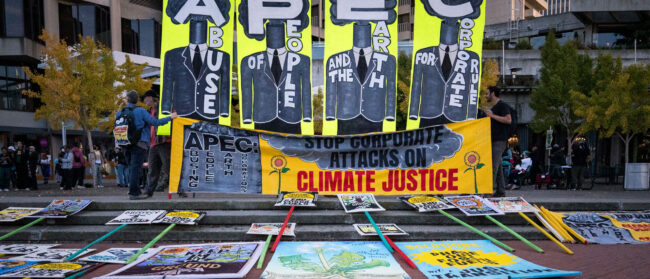If a tree falls in Cambodia’s forests, it will likely be cut into three-metre logs, loaded onto a truck, smuggled across the Vietnamese border and then sold for thousands of dollars in a country with a voracious appetite for the type of luxury wood that is becoming increasingly rare in the Kingdom.
Communities that rely on forests for food, shelter and to make a living are putting up a fight, but they are facing a ruthless and often faceless foe. The country’s most prominent environmental activist, Chut Wutty, was shot dead in April 2012 during an altercation with military police and security officials working for a logging firm in Koh Kong province. Environmental groups have reported that the destruction of Cambodia’s forests has since accelerated.
“Following Chut Wutty’s death, the crisis he was fighting in Cambodia’s farms and forests has got rapidly worse,” the environmental watchdog Global Witness said in a statement released one year after the activist was killed. According to a study published in the journal Science in November, more than 7% of Cambodia’s forest cover has been destroyed in the past 12 years – a rate that rivals Malaysia and Indonesia for the fastest in Asia, and ranks fifth in the world.
During its long rule, the Cambodian People’s Party has not ignored the problem. Prime Minister Hun Sen has repeatedly promised to personally tackle deforestation. In 1999, the prime minister publicly ordered his military commander to put a stop to illegal logging within three months. The trees continued to fall. In 2001, Hun Sen said that allowing expansive tracts of forests to be felled was his “biggest mistake” over the previous decade. Later that year, he said that if the licences of companies found to be logging illegally were not revoked, “I will cut my own head off”.

Despite an election in July last year that exposed the plummeting popularity of the prime minister, Hun Sen’s head is still firmly on his shoulders, and environmental activists fear that his administration will continue to pay lip service to protecting trees while allowing logging companies to have their way with Cambodia’s forests.
“If nothing changes in how the government manages forests, they will be gone during this [five-year] mandate,” said Chan Saveth, head of monitoring for the local rights group Adhoc, noting that private companies have continued to log outside their concessions and encroach upon national parks and protected forests with impunity.
Many communities across the country have banded together to try to protect the forests through regular patrols, but their efforts to alert authorities often fall on deaf ears, according to Saveth. This means that patrols often resort to burning piles of expensive timber to prevent the companies from coming back to collect them. Local authorities, Saveth said, often collude with companies to locate, log and sell sought-after wood – species that are supposed to be protected under Cambodian law.
“These community patrols are like a gust of wind that occasionally blows through the forest,” said Saveth. “The companies never stop cutting down the trees, even in the pouring rain.”
In Prey Lang, one of the largest lowland forests in Asia – covering 3,600-square-kilometres across four northern provinces – many of the communities that Chut Wutty helped bring together in a network to fight against deforestation are now acting against each other, according to Chhim Savuth, Wutty’s former right-hand man, who has carried on the fight to protect Prey Lang.

“The villagers know where the luxury trees are, so the companies and authorities pay them to go there and cut down the trees. In some places, the authorities buy chainsaws for the people. The villagers see that if they do not take this opportunity, someone else will,” said Savuth, adding that residents in Prey Lang can make up to $50 a day helping companies log the forest, while other means of income, such as collecting resin, earns them about $5 a day.
“Without the help of authorities, it is very difficult. It is difficult because the companies have a lot of money and we don’t. We try to talk to the people to explain the importance of protecting the forest for the future, but sometimes they don’t listen,” said Savuth, adding that he is frustrated by how little attention NGOs and other civil society organisations give to deforestation, one of the most pressing issues in rural Cambodia, where the vast majority of the population lives. “They should be putting their resources into going out to the countryside to teach residents how they can protect natural resources,” Savuth said.
Few people in Cambodia’s government understand the country’s forests better than Mok Mareth, the environment minister for 20 years from 1993 as well as chair of the National Assembly’s Commission on Environment and Water Resources.
“We need to recognise legal logging as a plan,” Mareth said. The clearing of Cambodia’s forests, he said, has made way for agricultural plantations – 80% of which will yield rubber trees. He believes that these trees will ultimately serve the people and add to the economy. “Right now there are 100,000 jobs [created through economic land concessions]. There will be 1.5 million in 2015. Not only on plantations, but also in processing factories. These companies grow very fast,” he said.
Although the government has put a moratorium on granting economic land concessions (ELCs) – massive tracts of land, totalling 10% of the country’s total surface area, leased to private companies in the name of agricultural development – they continue to be at the heart of deforestation. With ELCs the only places in Cambodia where logging is legal, environmentalists say that loggers are illegally felling trees outside of these areas and bringing the high-end wood inside the boundaries, where it can be sold to private companies.

“We know that [illegal logging] is happening outside ELCs, we recognise that. If we have a witness, and evidence – those two things together – then we will take action,” Mareth said. Asked why, then, local authorities are not taking action against the illegal logging being documented by community forest patrols, Mareth said: “The problem is very hard to control. We have a small number of rangers. Of course, they cooperate with other forces, but it’s not enough.”
Cheuy Oudormreaksmey, like his father Chut Wutty, says that nothing will stop him from fighting to protect Cambodia’s forests. Stouter than his svelte father, Oudormreaksmey has been patrolling the forests since he was a boy. Now, he is studying to be a lawyer at the Royal University of Law and Economics in Phnom Penh.
“I will take what I have studied and use this subject to continue my father’s work. I plan to be an activist, but I don’t know yet if I can truly fill my father’s shoes,” Oudormreaksmey said, adding that he is working with Chhim Savuth to secure funding for an NGO that will give community activists the tools they need to guard their forests.
“Only a small number of people in the community have defected to the companies. People working directly for the companies are still doing most of the illegal logging,” said Oudormreaksmey. “The main problem is that people don’t know how to stand up and follow the proper procedure to file a complaint or bring attention to the illegal loggers. We will keep trying to convince communities to continue my father’s work and protect the forests.”


